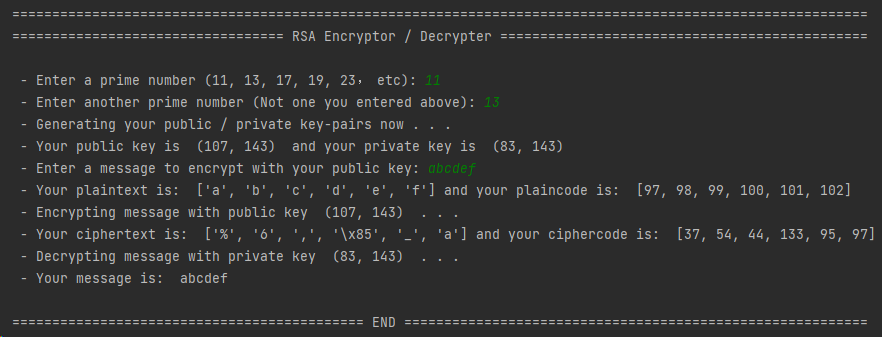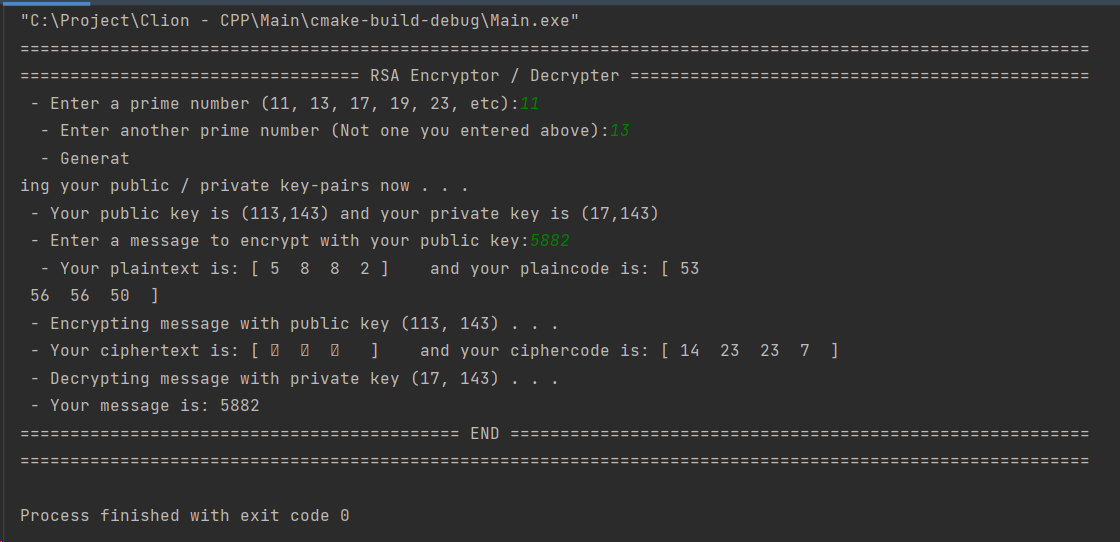一 欧拉数论定理
1. 欧拉函数
设n为一正整数,则欧拉函数
φ
(
n
)
\varphi (n)
φ(n)等于
0
∼
n
−
1
0\sim n-1
0∼n−1中与n互素的整数个数
比如
φ
(
5
)
=
4
\varphi (5) = 4
φ(5)=4,因为0~5中, 1,2,3,4均与5互素,即最大公约数为1
2. 欧拉定理
设a,n为两个正整数,且(a,n)=1,则有: a φ ( n ) ≡ 1 m o d ( n ) a^{\varphi (n)} \equiv 1 \, mod (n) aφ(n)≡1mod(n)
二 RSA数学原理
给定两个不同的素数p,q,令n=p*q,则 φ ( n ) = ( p − 1 ) ( q − 1 ) \varphi (n) = (p-1)(q-1) φ(n)=(p−1)(q−1),对于满足 c d ≡ 1 m o d ( φ ( n ) ) cd \equiv 1 mod (\varphi (n)) cd≡1mod(φ(n))的两个正整数c,d,显然满足: a c d ≡ a m o d ( n ) a^{cd} \equiv a \, mod (n) acd≡amod(n)。
(1) 对于明文M,则有密文C=M^e mod n (获得密文是明文的e次方再模n)
(2) 对于密文C,则有明文M=C^d mod n (获得明文是密文的d次方再模n)
明文和密文的产生是建立在一对密钥的基础上的,即(e,n)和(d,n) 。其中,(e,n)称为公钥 , (d,n)称为私钥。公钥在网络中公开,谁都可以使用;私钥在本地保存,仅限自己使用。根据数论,寻求两个大素数比较简单,而将它们的乘积进行因式分解却极其困难,因而在大素数条件下根据公钥去计算私钥是比较耗时的过程,由此保证了信息的安全。
三 Python实现RSA
import random
'''
计算两个整数的最大公因数,采用欧几里得算法,其原理具体描述为:
假设 a = t*b + r ,那么a与b最大公约数等于b与r最大公约数
gcd(a,b) = gcd(b,r)
'''
def gcd(a, b):
while b != 0:
a, b = b, a % b
return a
'''
当满足 ab同余1模m 时,b即为 a模m 下的逆,采用欧几里得算法反推计算
A1 = T1*A2 + A3
A2 = T2*A3 + A4
......
An = Tn*A(n+1) + A(n+2)
结束时,A(n+2) = 1
'''
def inverse(e, phi):
a, b, t = phi, e, 0
x, y = 0, 0
x1, y1 = 1, 0
x2, y2 = 0, 1
while (a % b) != 1:
t = a // b
x, y = x2, y2
x2, y2 = x1 - t * x2, y1 - t * y2
x1, y1 = x, y
a, b = b, a % b
t = a // b
x, y = x1 - t * x2, y1 - t * y2
return (y + ((abs(y)) // phi + 1) * phi) % phi
'''
测试所选整数是不是质数
'''
def is_prime(num):
if num == 2:
return True
if num < 2 or num % 2 == 0:
return False
for n in range(3, int(num ** 0.5) + 2, 2):
if num % n == 0:
return False
return True
'''
生成公钥和私钥
'''
def generate_key_pair(p, q):
if not (is_prime(p) and is_prime(q)):
raise ValueError('Both numbers must be prime.')
elif p == q:
raise ValueError('p and q cannot be equal')
if p < 11 or q < 11:
raise ValueError('p or q should larger than 10') # 保证n大于128,容纳ASCII字符
n = p * q
phi = (p - 1) * (q - 1)
e = random.randrange(1, phi)
g = gcd(e, phi)
while g != 1:
e = random.randrange(1, phi)
g = gcd(e, phi)
d = inverse(e, phi)
# Public key is (e, n) and private key is (d, n)
return ((e, n), (d, n))
def encrypt(pk, plaincode):
key, n = pk
ciphercode = [pow(code, key, n) for code in plaincode]
return ciphercode
def decrypt(pk, ciphercode):
key, n = pk
plaincode = [pow(code, key, n) for code in ciphercode]
plaintext = [chr(code) for code in plaincode]
return ''.join(plaintext)
if __name__ == '__main__':
'''
Detect if the script is being run directly by the user
'''
print("===========================================================================================================")
print("================================== RSA Encryptor / Decrypter ==============================================")
print(" ")
p = int(input(" - Enter a prime number (11, 13, 17, 19, 23, etc): "))
q = int(input(" - Enter another prime number (Not one you entered above): "))
print(" - Generating your public / private key-pairs now . . .")
public, private = generate_key_pair(p, q)
print(" - Your public key is ", public, " and your private key is ", private)
message = input(" - Enter a message to encrypt with your public key: ")
plaintext = [char for char in message]
plaincode = [ord(char) for char in message]
print(" - Your plaintext is: ", plaintext, "and your plaincode is: ", plaincode)
print(" - Encrypting message with public key ", public, " . . .")
ciphercode = encrypt(public, plaincode)
ciphertext = [chr(code) for code in ciphercode]
print(" - Your ciphertext is: ", ciphertext, "and your ciphercode is: ", ciphercode)
print(" - Decrypting message with private key ", private, " . . .")
print(" - Your message is: ", decrypt(private, ciphercode))
print(" ")
print("============================================ END ==========================================================")
print("===========================================================================================================")

四 C语言实现RSA
#include <stdio.h>
#include <stdlib.h>
#include <time.h>
#include <iostream>
#include <wchar.h>
using namespace std;
// 计算最大公因数
int gcd(long int a, long int b){
return b==0?a:gcd(b,a%b);
}
// 计算模phi的逆
int inverse(long int e, long int phi){
long int a=phi, b=e, t=0;
long int x=0, y=1;
while(a%b!=1){
t = x;
x = y;
y = t-y*(a/b);
t = a;
a = b;
b = t%a;
}
return ((x-y*(a/b))%phi+phi)%phi;
}
//检测是不是质数
int is_prime(long int num){
if (num==2) return 1;
if (num<2||num%2==0) return 0;
long int n = 3;
while(1){
if (n*n>num) return 1;
if (num%n==0) return 0;
n += 2;
}
}
void generate_key_pair(long int p, long int q, long int* r){
if (!(is_prime(p)&&is_prime(q))){
printf("Both numbers must be prime.");
exit(2);
}
if (p==q||p+q<24){
printf("p and q cannot be equal.");
exit(2);
}
long int n = p * q;
long int phi = (p - 1) * (q - 1);
srand((unsigned)time(NULL));
long int e = (rand()+1)%phi;
long int g = gcd(e, phi);
while (g != 1){
e = (e+rand()+1)%phi;
g = gcd(e, phi);
}
long int d = inverse(e, phi);
// Public key is (e, n) and private key is (d, n)
r[0] = e;
r[1] = n;
r[2] = d;
r[3] = n;
}
// 指数取模运算
long int ModExp(long int base, long int exp, long int mod){
long int res = 1;
while(exp){
if (exp%2==1) res = (res*base) % mod;
exp /= 2;
base = (base*base) % mod;//底数平方
}
return res;
}
void encrypt(long int* pk, long int* plaincode, long int* ciphercode, int length){
int key=pk[0], n=pk[1];
for (int i=0;i<length;i++) ciphercode[i] = ModExp(plaincode[i],key,n);
}
wstring decrypt(long int* pk, long int* ciphercode, int length){
int key=pk[0], n=pk[1];
wstring result;
long int* plaincode = (long int*)malloc(length*sizeof(long int));
for (int i=0;i<length;i++) plaincode[i] = ModExp(ciphercode[i],key,n);
for (int i=0;i<length;i++) result = result + wchar_t(plaincode[i]);
return result;
}
int main(){
printf("===========================================================================================================\n");
printf("================================== RSA Encryptor / Decrypter ==============================================\n");
long int p,q;
printf(" - Enter a prime number (11, 13, 17, 19, 23, etc): ");
cin >> p;
printf(" - Enter another prime number (Not one you entered above): ");
cin >> q;
long int* key_pairs = (long int*)malloc(4*sizeof(long int));
printf(" - Generating your public / private key-pairs now . . .\n");
generate_key_pair(p,q,key_pairs);
long int* key_public = (long int*)malloc(2*sizeof(long int));
long int* key_private = (long int*)malloc(2*sizeof(long int));
key_public[0]=key_pairs[0];
key_public[1]=key_pairs[1];
key_private[0]=key_pairs[2];
key_private[1]=key_pairs[3];
printf(" - Your public key is (%ld,%ld) and your private key is (%ld,%ld)\n",key_public[0],key_public[1],key_private[0],key_private[1]);
printf(" - Enter a message to encrypt with your public key: ");
wstring message;
wcin >> message;
int length = message.size();
long int* plaincode = (long int*)malloc(length*sizeof(long int));
long int* ciphercode = (long int*)malloc(length*sizeof(long int));
for (int i=0;i<length;i++) plaincode[i] = message[i];
cout << " - Your plaintext is: [";
for (int i=0;i<length;i++) wcout << " " << message[i] << " ";
cout << "] and your plaincode is: [";
for (int i=0;i<length;i++) cout << " " << plaincode[i] << " ";
cout << " ]" << endl;
printf(" - Encrypting message with public key (%ld, %ld) . . .\n", key_public[0], key_public[1]);
encrypt(key_public,plaincode,ciphercode,length);
cout << " - Your ciphertext is: [";
for (int i=0;i<length;i++) wcout << " " << wchar_t(ciphercode[i]) << " ";
cout << "] and your ciphercode is: [";
for (int i=0;i<length;i++) cout << " " << ciphercode[i] << " ";
cout << " ]" << endl;
printf(" - Decrypting message with private key (%ld, %ld) . . .\n", key_private[0], key_private[1]);
wstring ws = decrypt(key_private, ciphercode,length);
wcout << " - Your message is: " << ws << endl;
printf("============================================ END ==========================================================\n");
printf("===========================================================================================================\n");
return 0;
}


























 1393
1393











 被折叠的 条评论
为什么被折叠?
被折叠的 条评论
为什么被折叠?










